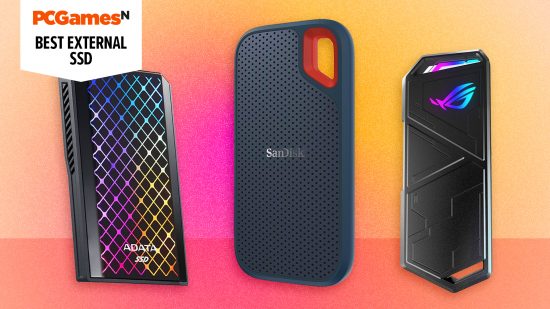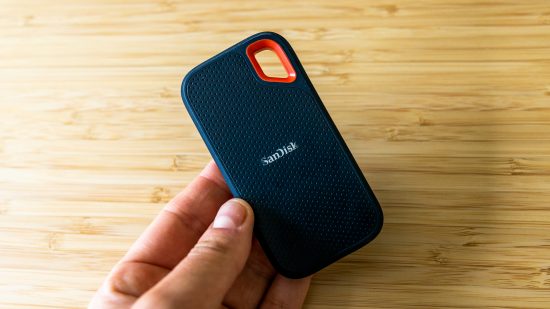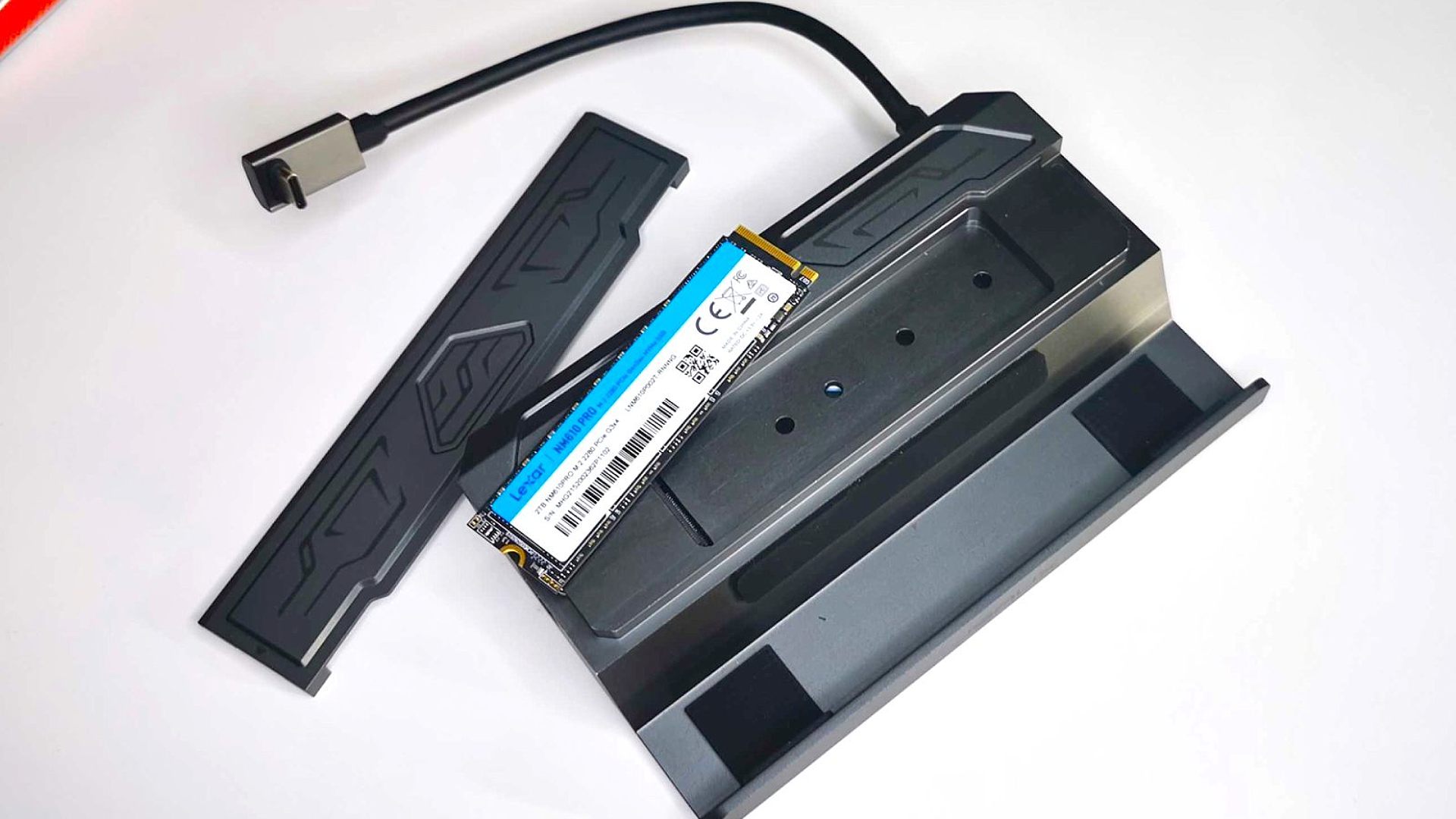What is the best external SSD for gaming? Finding the best external SSD for gaming is a relatively inexpensive way to expand storage and speed up the loading times of the best PC games without the hassle of rummaging around the insides of your machine. Simply plug one into a free USB port on your gaming PC or gaming laptop, install your game, and play to your heart’s content.
Portable SSDs don’t have to be bland boxes. Adata leans into a distinct RGB-lit honeycomb effect and Sandisk makes a dust- and water-resistant NVMe drive that fits into the palm of your hand. You can even do it yourself if you own a spare internal NVMe thanks to an enclosure from Asus turning your existing drive into a portable storage device.
Portable and external options do come with some caveats, of course, such as slower speeds. They’re a marked improvement over hard drives, but you’ll want to grab the best SSD for gaming if you’re all about performance. Check out our guide on how to install an SSD to make sure it sits correctly.
So why buy an external SSD? The advantage of a portable SSD is that you can swap it between devices without any fuss. With so many prices to choose from and read speeds ranging from 540MB/s all the way up to 2,800MB/s, we’ve rounded up a selection of drives for every usage and budget so you can choose the best external SSD for you.
Get gaming gear for less ☞ Our free money-saving tool finds discounts for you at over 40,000 online retailers. Try PCGamesN Deal Finder now.
Find the best external SSD for gaming today:
- Samsung Portable T7 Shield – best external SSD overall.
- Adata SE900G – best external SSD for gaming.
- Sandisk Extreme Portable – top portable SSD.
- Samsung X5 – fastest external SSD.
- Asus ROG Strix Arion – best NVMe enclosure.
- Samsung Portable T7 – Best budget external SSD.
- Seagate Storage Expansion Card – best SSD for Xbox.
- Jsaux M.2 Steam Deck dock – best external Steam Deck SSD.
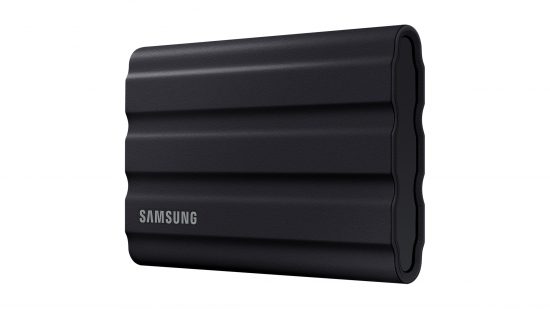
1. Samsung Portable T7 Shield
The best external SSD overall.
Samsung Portable SSD T7 Shield Specs:
| Drive | PCIe NVMe |
| Connection | USB 3.2 |
| Capacity | 500GB / 1TB / 2TB |
| Read speed | 1000MB/s |
| Write speed | 1050MB/s |
The Samsung Portable T7 Shield offers the same specs as the Samsung T7 in sixth place in our guide and uses USB 3.2 for transfer speeds of up to 1000MB/s and 1050MB/s read and write respectively. We’ve picked this rugged external SSD as the top choice because it combines a reasonable price, durable design, fast transfer speeds, and a generally seamless experience.
In terms of looks, it’s not an SSD designed exclusively with gamers in mind and therefore is a little on the utilitarian side. The exterior is made from rubber, and Samsung’s Dynamic Thermal Guard controls heat to maintain performance even for big transfers. The SSD’s IP65 rating also means a certain level of water and dust resistance, so you can be sure that it’ll maintain performance even after an accidental spill or drop.
If you’re after a versatile, well-protected, and affordable external SSD for gaming, the Samsung Portable T7 Shield is for you. If you don’t need the extra protection, go for the standard T7 below.
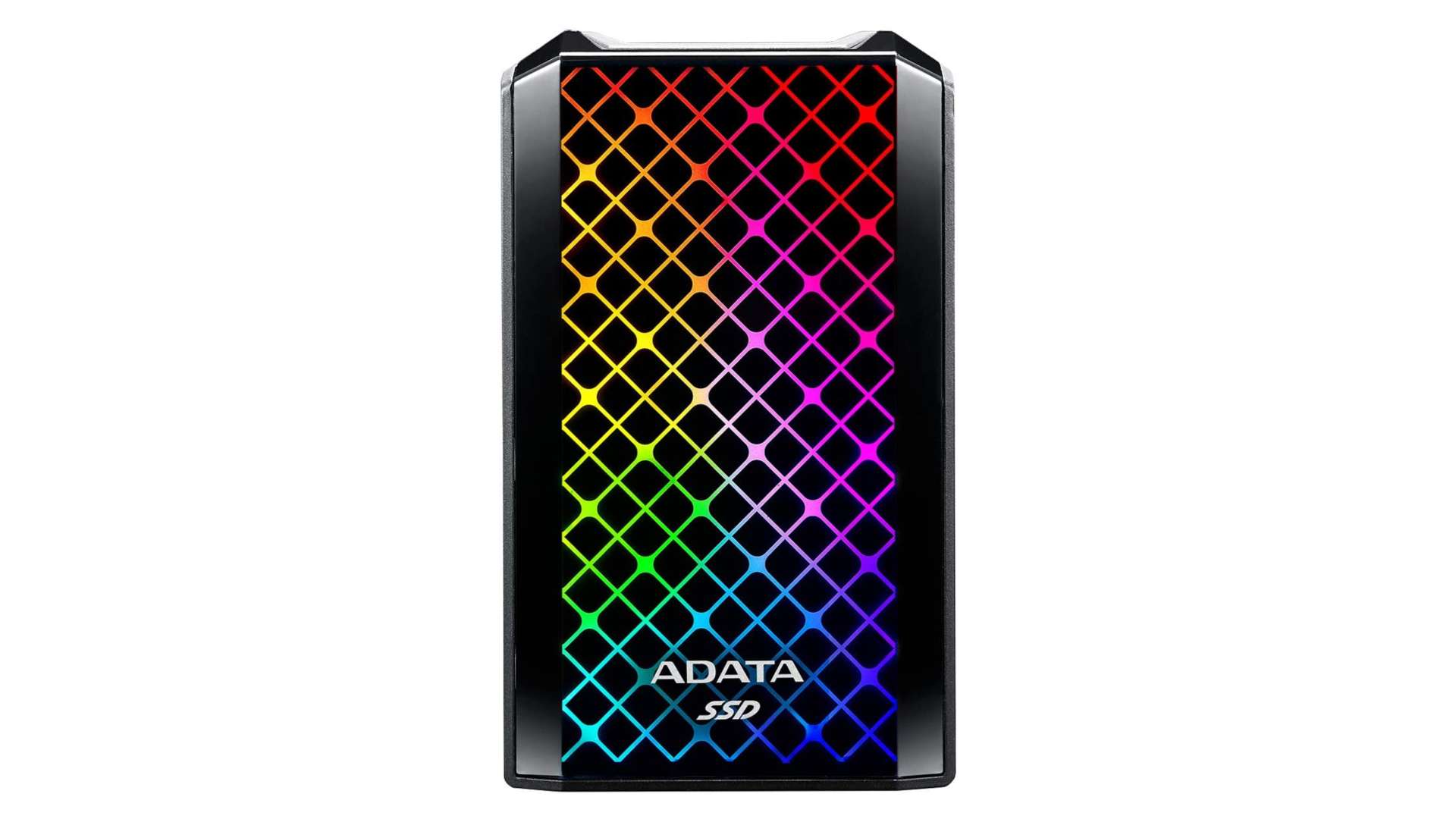
2. Adata SE900G
The best external SSD for gaming is the Adata SE900G.
Adata SE900G Specs:
| Drive | NVMe |
| Connection | USB Type-C / Type-A |
| Capacity | 512GB / 1TB / 2TB |
| Read speed | 2,000MB/s |
| Write speed | 2,000MB/s |
Adata’s NVMe-based model is one of the fastest external drives we’ve seen, with both the sequential read and write speeds coming in at 2,000MB/s. It connects via a USB Type-C cable, although Adata includes a Type-A adapter in the box to better cater to more devices. We’d recommend the 1TB capacity model, although it’s also available as a 512GB or 2TB drive.
The RGB lighting covering the top of the drive is a flashy touch, making it look at home with the best gaming keyboard and best gaming mouse.
3. SanDisk Extreme Portable V2
The best rugged external SSD.
Sandisk Extreme Portable specs:
| Drive | NVMe |
| Connection | USB Type-C / Type-A |
| Capacity | 500GB / 1TB / 2TB / 4TB |
| Read speed | 1,050MB/s |
| Write speed | 1,000MB/s |
We love the Sandisk Extreme Portable, which is now on V2 thanks to its continued popularity. Despite its small size of 2.07 x 3.97 inches, the Extreme Portable still packs a punch. Thanks to the NVMe drive under the hood, it’s capable of swift sequential read and write speeds of 1,050MB/s and 1,000MB/s respectively.
It can also take a beating with two-meter drop protection, and IP55 water and dust resistance, making it the perfect travel companion for the best gaming laptop – not that we recommend chucking it around. We’ve used our original drive every single day for years, and have never once had any issues.
It connects via USB Type-C, although there’s a Type-A adaptor included too. You can pick the drive up in capacities ranging from 500GB up to a whopping 4TB, and sizes from 1TB now come in two funky blue colorways. It truly is portable and is designed with a hole in the corner so that you can clip it onto your keys or a bag.
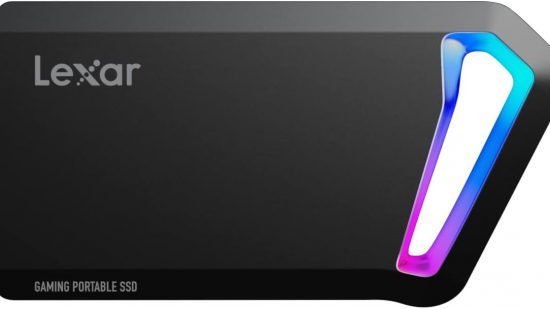
4. Lexar SL660 Blaze Portable SSD
The best portable gaming SSD.
Lexar SL660 Blaze Specs:
| Drive | NVMe |
| Connection | USB 3.2 |
| Capacity | 512GB / 1TB / 2TB |
| Read speed | 2000MB/s |
| Write speed | 1900MB/s |
The Lexar Blaze SL660 is the perfect choice for you if you want a dedicated portable gaming SSD. Compatible with PC, as well as PS5, PS4, Xbox, it’s a versatile drive that combines reliability and performance with a great price. It’s not the fastest SSD in this guide, but the USB 3.2 Gen 2×2 support ensures fast read and write speeds.
Like the Asus ROG Strix Arion below, the Blaze has a gorgeous RGB design. At just 2.5 inches wide, it also boasts a truly portable form factor, comes with a detachable stand for added functionality, and its aluminum construction ensures protection from shock and drops. Security-wise, it offers 256-bit AES encryption software solution to protect your data.
The downside of the Lexar Blaze SL660 gaming SSD is that it needs a USB 3.2 Gen 2×2 connection to get the best performance. The capacity also maxes out at 1TB, which may be too low for some, but if you want a truly portable SSD to complement a larger hard drive, this might not be a problem.
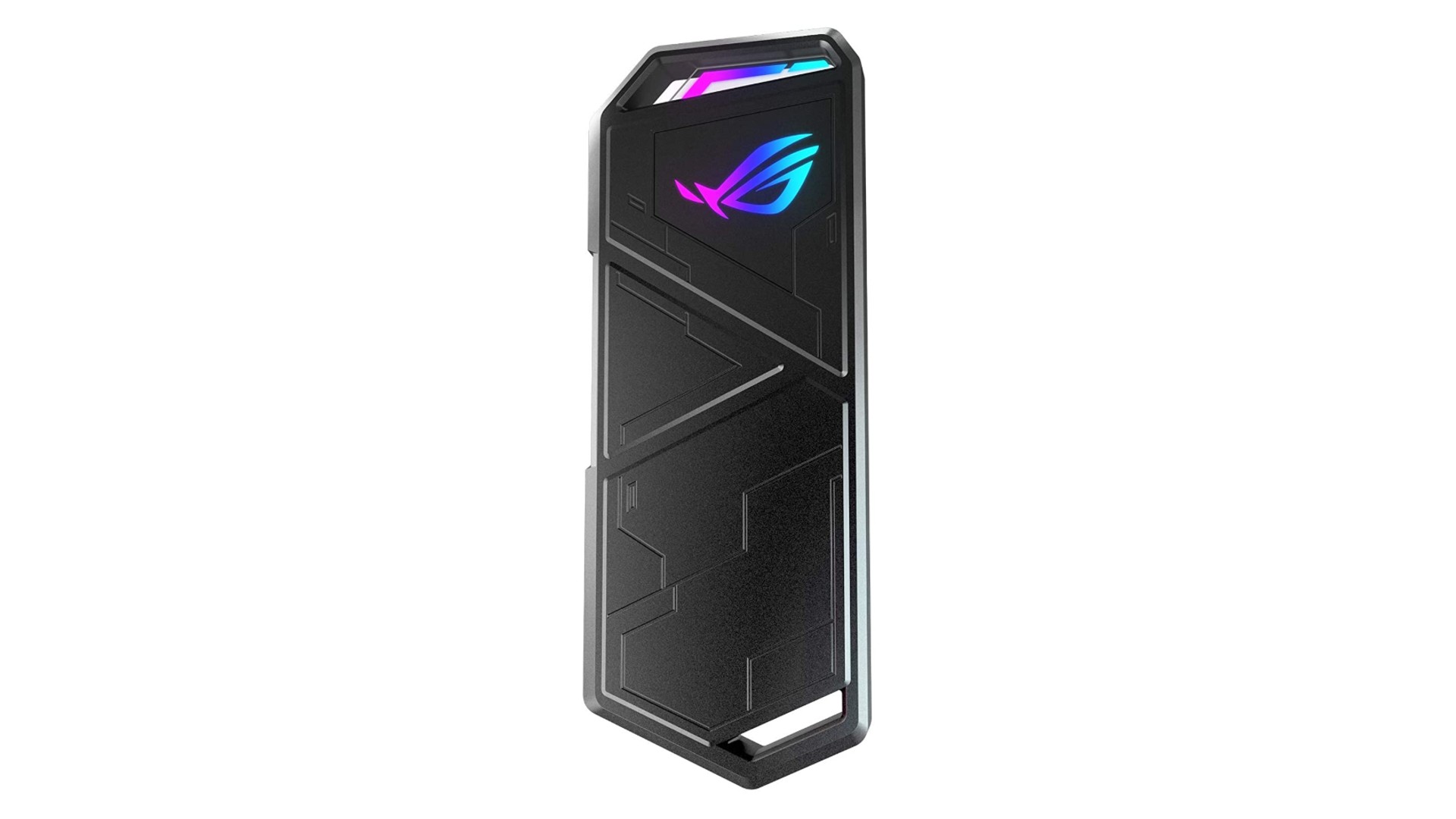
5. Asus ROG Strix Arion
The best NVMe enclosure is the Asus ROG Strix Arion.
Asus ROG Strix Arion Specs:
| Drive | NVMe |
| Connection | USB-C 3.2 Gen 2 |
| Capacity | N/A |
| Read speed | N/A |
| Write speed | N/A |
If you’ve already got a spare internal NVMe drive, the Arion can convert into an external SSD that looks a treat compared to other enclosures. The USB-C 3.2 Gen 2 connection transfers up to 10Gb/s, letting it take full advantage of even the fastest NVMe models.
The aluminum casing also has some adjustable RGB lighting for extra flair, while thermal pads inside help to keep temperatures low to avoid thermal throttling.
6. Samsung Portable SSD T7
The best budget external SSD.
Samsung T7 Specs:
| Drive | PCIe NVMe |
| Connection | USB 3.2 |
| Capacity | 500GB / 1TB / 2TB |
| Read speed | 1000MB/s |
| Write speed | 1050MB/s |
The Samsung T7 uses USB3.2 to allow zippy transfer speeds NVMe form factor, but this helps to keep the price low. In fact, it’s the best budget external SSD that’s almost nine times faster than an external hard drive, rated at 1000MB/s sequential read and 1050MB/s sequential write speeds – double the previous Samsung T5 for around the same price.
The T7 is well-built, with a sturdy metal enclosure that you can buy in several bright colorways. Although it isn’t as rugged as the T7 Shield SSD that takes the top spot in our guide, it’s a brilliantly affordable option. And with a three-year guarantee, you can be reassured against your purchase for some time to come.
The all-metal body gives it a solid feel and helps it withstand drops of two meters. And, if security is at the front of your mind, you can use Samsung’s software to lock the drive with a 256-bit encrypted password.
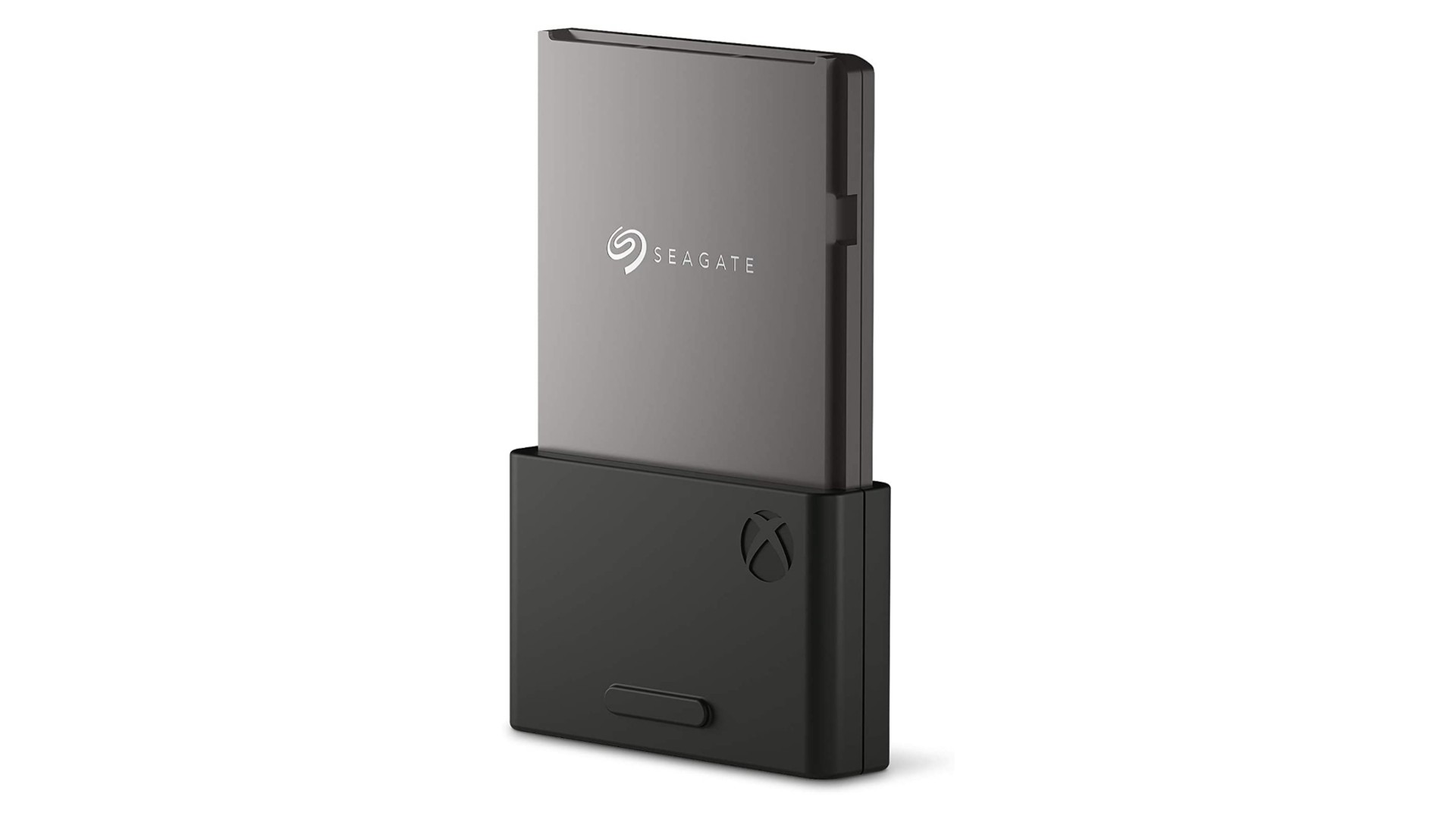
7. Seagate Storage Expansion Card
The best SSD for Xbox consoles.
Seagate Storage Expansion Card specs:
| Drive | NVMe |
| Connection | Xbox expansion slot |
| Capacity | 1TB / 2TB |
| Read speed | N/A |
| Write speed | N/A |
The Xbox Series X / S won’t allow you to install and play current generation games on any random external SSD, instead making use of the expansion slot on the rear of the console. Seagate’s NVMe is currently the only model that fits into Microsoft’s proprietary port and offers read and write speeds identical to the console’s internal NVMe solid-state drive.
There’s no USB connection, however, so this is solely an external SSD for the latest Xbox consoles rather than one for your PC.
8. Jsaux M.2 Steam Deck dock
The best external Steam Deck SSD is the Jsaux M.2 SSD Steam Deck dock.
Jsaux M.2 Steam Deck dock specs:
| Drive | NVMe |
| Connection | USB-C |
| Capacity | 1TB, 2 TB |
| Read speed | 3,300MB/s |
| Write speed | 2,600MB/s |
Valve’s handheld has a solid-state drive dwelling within, but the Jsaux M.2 SSD Steam Deck dock will save you from upgrading the handheld’s innards. Rather than using a separate exclosure, the docking station features its own slot stowed away under a back cover, meaning you’ll have less cover when playing in desktop mode.
Opting for the M.2 Steam Deck dock over an internal SSD upgrade means you’ll be able to add up to 2TB of external storage, and you can either choose your own drive or pick up one of Jsaux’s bundles. The setup makes for a great way to swap games between your desktop setup and the handheld’s storage, which in turn will save you from constantly deleting things to make room.
If you’re keen to learn more about the docking station’s other capabilities, we’d suggest checking out of Jsaux M.2 Steam Deck dock review. You’ll also find a variety of different add-ons within our best Steam Deck accessories list, including alternative ways to expand the handheld’s storage.
Why choose an SSD over HDD
Simply put, SSD technology arrived on a mass-produced scale over the last few years, and regular HDDs simply don’t stack up well when compared. The risk of having moving parts within your storage that are prone to failure or damage means SSD technology is far safer and more secure, as well as carrying superior read/write speeds.
Do SSDs come with security features?
Some SSDs will have security features that you can enable on them, ranging from simple password protection, all the way to fingerprint recognition. If this is something you require, be sure to check the features and specifications of any device to see what it is capable of.
How long do SSDs last?
There really is no age ceiling on an SSD. We would simply suggest that they could last in excess of ten years if looked after. Unlike HDDs, there are no moving parts to an SSD, so the risk of failure is far lower, even after over a decade of use.
